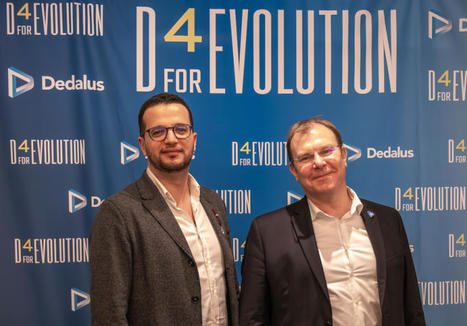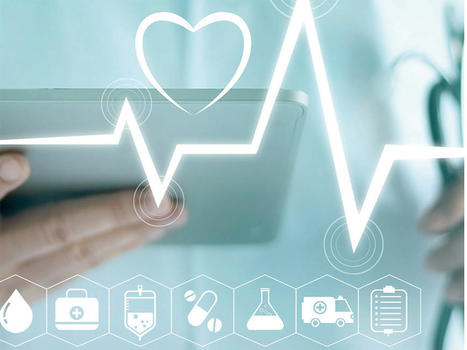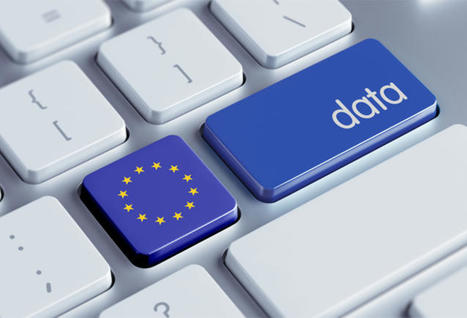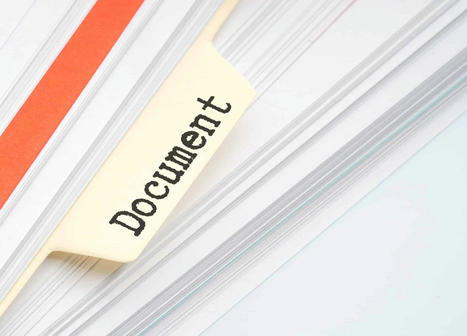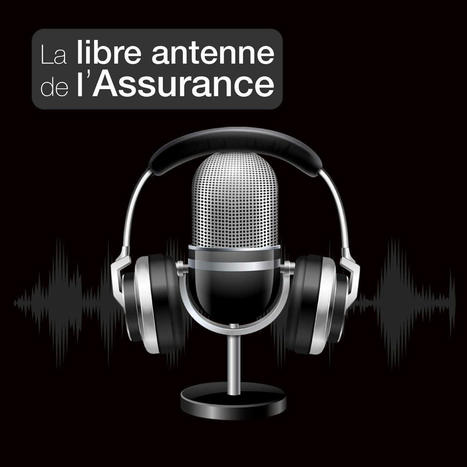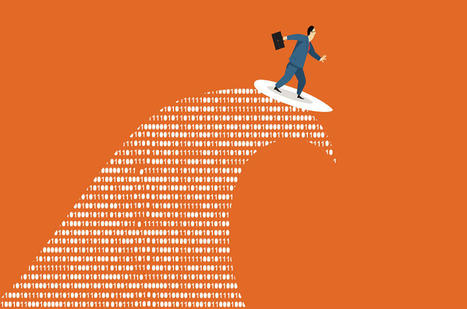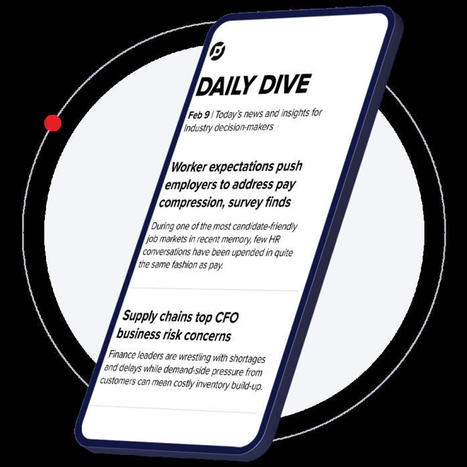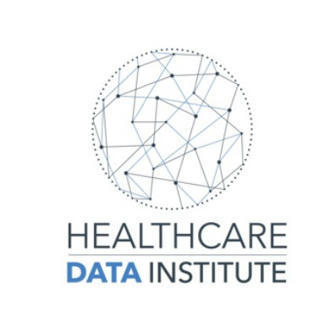Have you seen my other scoop it? http://www.scoop.it/u/lionel-reichardt
Research and publish the best content.
Get Started for FREE
Sign up with Facebook Sign up with X
I don't have a Facebook or a X account
Already have an account: Login

7- DATA, DATA,& MORE DATA IN HEALTHCARE by PHARMAGEEK
278.4K views |
+2 today
Follow
| Tags |
|---|
#survey #report #ebook #studies #ehealth #mhealth #healthcare
Curated by
Lionel Reichardt / le Pharmageek
 Your new post is loading... Your new post is loading...
 Your new post is loading... Your new post is loading...
From
mbamci
Les données sont au cœur de la transformation numérique de la santé. Elles permettent de créer des expériences sur mesure pour les patients. Via Emmanuel Capitaine
From
www
Quel est le contenu du guide ? L’obligation de sécurité en matière de traitement de données personnelles, inscrite dans la loi depuis 1978, a été renforcée par le RGPD. Il peut cependant être difficile, lorsque l’on n'est pas familier avec les méthodes de gestion des risques, de mettre en œuvre une telle démarche et de s’assurer que le nécessaire a bien été fait. Via Frédéric DEBAILLEUL
From
www
Frédéric Serein, Directeur commercial et du Business Développement, Salaheddine Harbala, Business Development Manager de Dedalus France reviennent sur les ambitions affichées par le groupe autour de la valorisation des données de santé et de l’intelligence artificielle. Via Emmanuel Capitaine
From
www
Pour permettre le plein potentiel d'exploitation du patrimoine collectif des données de santé, il est nécessaire de relever des défis réglementaires, techniques et organisationnels de façon coordonnée et concertée. Via Doc-Ifsi-Narbonne
2023-12-24 23:35:17 Contenu Les projets d’une biobanque suisse basée sur le modèle britannique sont bien avancés. L’étude coûterait 100 millions de francs. Nicole Probst-Hensch mène des recherches à l’Institut suisse de santé publique et tropicale (Swiss TPH) à Allschwil, dans la région bâloise. Via Emmanuel Capitaine
Le GRAS (Groupe de Recherche et d’Action pour la Santé asbl), la FAGC (Fédération des Associations de médecins Généralistes de Charleroi) et la SMC (Société de Médecine de Charleroi) viennent d’organiser un débat intitulé "Les médecins , encodeurs des GAFAM ? ". Le tableau dressé ne semble pas rassurant, ni pour les médecins, ni pour les patients. Via Philippe Marchal
TICpharma.com est un site d'informations sur la transformation digitale des industries de sant�. Via Rémy TESTON
Via Gabriel David
Google a annoncé la mise à disposition un outil de mesure permettant de connaître les types de pollens et leur concentration près de chez soi. Via Emmanuel Capitaine
Via Rémy TESTON
Le député Philippe Latombe a obtenu que le Health Data Hub lui communique - en partie - son comparatif de fournisseurs d'hébergement.
Dans le cadre de l’attaque massive de piratage relative à l’outil populaire de transfert de fichiers d’entreprise MOVEit Transfer, les pirates ont accédé aux données de santé confidentielles de 1,7 million de citoyens de l’Oregon. Les victimes se prononcent et la liste pourrait s’allonger avec la poursuite des sondages. De grandes structures touchées Dans un avis |
From
www
Deux mois après le lancement de Lifen Qualité, outil IA d’assistance des établissements de santé dédié à la réalisation des audits qualité réglementaires, Lifen, entreprise spécialisée dans l’intelligence des données de santé, s’associe au créateur de logiciels de santé Maincare (filiale de... Via Emmanuel Capitaine
Les négociateurs du Parlement européen et des Etats membres sont parvenus vendredi à un accord sur une législation facilitant notamment l'accès du personnel de santé au dossier médical d'un patient se trouvant dans un autre Etat de l'UE que son pays de résidence. Via Philippe Marchal
From
www
Les cyberattaques s'enchaînent en France. D'année en année, les cybercriminels gagnent de plus en plus d'argent en s'attaquant aux Français. Plusieurs facteurs permettent d'expliquer cette hausse fulgurante des offensives dans l'Hexagone. On fait le point avec plusieurs experts en cybersécurité. Via Rémy TESTON
After a United Health Group subsidiary was hit with a cyberattack, evidence shows the industry’s transformation is having a positive impact. Via Emmanuel Capitaine
Il est évoqué l'attaque cyber auprès des serveurs de Viamedis et Almerys, deux opérateurs qui assurent la gestion du tiers payant des assureurs santé en France... Via Emmanuel Capitaine
Les patients européens bénéficieront bientôt d'un espace unifié de données de santé. Le Parlement européen a adopté mercredi la position de principe qu'il défendra lors des négociations avec les Etats membres. L'objectif de ce système est de permettre aux patients de mieux contrôler leurs données médicales et de les rendre accessibles à travers l'UE. Via Philippe Marchal
L'Agence de cybersécurité et de sécurité des infrastructures (CISA) propose un guide pour combattre les menaces cybernétiques affectant le secteur de la santé. Via Emmanuel Capitaine
La société américaine Palantir a remporté un contrat avec le NHS pour mettre en place un nouveau système d'échange de données de santé.
Med City News A few years ago, some colleagues and I were discussing the implications of the “post-EHR” world, where everyone has electronic health records and, with the pending mandates of the 21st Century Cures Act, systems would soon be required to share data. This discussion arose from the ongoing issue that clinicians still struggle to find clinically relevant information in a patient’s medical record. We recognized that before the industry can address the problem of finding clinically relevant information in the overwhelming amount of incoming data, we needed to tackle the fact that current “legacy” EHRs pose challenges in finding relevant clinical information within their own systems. Effectively, users were digging through dumpsters to find data. While users have access to a problem list, medication list, lab orders and results, physician and nursing notes, and other information in various formats, a considerable portion of the data remains in free-text notes. This forces users to navigate to a separate section of a chart to find items in a specific domain. As a result, users waste excessive time searching for items that are clinically relevant to a specific problem. Most current EHRs lack the capacity to provide a holistic view for a particular clinical condition. The second wave arrives Fast-forward to the present, where data sharing and penalties for information blocking are increasing and EHR companies must release more data into the marketplace. Dumpster diving for data is now a reality. Now, let’s consider the “second wave” – the influx of information from the new and upcoming generations of wearables. The new Apple Watch “ultra” is expected to feature a transdermal glucose monitor, enabling users to continually monitor their glucose levels. Additionally, there are already devices that enable users to take clinical-grade, 6-lead EKGs at home and send the results to their cardiologists as a PDF. These examples merely scratch the surface of the volume of new data available, with more to come. However, is all this data connected? Is it diagnostically relevant? Can clinicians effectively find specific data points they need among the overwhelming amount of information they are receiving for managing a particular condition? A clinician may want to view data related to a patient’s heart arrhythmia without the noise of other unrelated data. Yet, this new data exists, and more is on its way, requiring a destination for storage. Let’s consider the pending glucose monitoring capability. While many individuals manage their diabetes independently, how can clinicians aggregate thousands of data points? How can they organize and connect all this data clinically? Intelligent viewers and structure data Clinicians need an intelligent viewer that can convert unstructured data into structured data and then slice and dice it to suit their needs. They require a smart view that can not only sift through, sort, and categorize the influx of data but also comprehend the patient’s condition. Ultimately, regardless of the EHR or data origin, clinicians need a universal tool to derive value from the data at the point of care. These tools must be compatible with legacy EHRs, as they won’t disappear anytime soon. Given the increasing requirements for data and outcome reporting, such as electronic clinical quality measures (eCQMs) and the management of Medicare Advantage patients using hierarchical condition codes (HCCs), legacy EHRs often rely on “curation.” This involves utilizing a mix of terminologies and code sets originally designed to meet billing and transaction requirements from the last century. These systems do offer a coded problem list in either ICD-10-CM or SNOMED, laboratory data often coded to CPT or LOINC, and medication lists coded to RxNorm. Unfortunately, all these codes and terminologies typically exist in separate sections of the EHR, possess different formats and data schemas, and are not designed to work together to support clinicians at the point of care. Consequently, more dumpster diving for data is necessary. Aggregate, organize, connect As technology continues to advance and the collection of health data grows exponentially, the need for efficient and effective tools to navigate and make sense of this vast amount of information becomes increasingly apparent. Clinicians are faced with the challenge of locating specific data points that are relevant to their patients’ conditions among the overwhelming quantity of incoming data. The limitations of current EHR systems compound this issue, as they often lack the capacity to provide a comprehensive view of a patient’s clinical condition. The emergence of new capabilities on wearable devices, and the resulting data, will exacerbate the situation. While these advancements offer valuable insights, the question of data connectivity and diagnostic relevance remains. Clinicians must adapt to this influx of information and find ways to effectively aggregate, organize, and connect the data in order to make informed clinical decisions. To address these challenges, there is a pressing need for intelligent viewers that can convert unstructured data into structured formats and offer the ability to analyze and interpret the data according to specific clinical requirements. These tools should be capable of sifting through the data, sorting it, categorizing it, and comprehending the patient’s condition. While legacy EHRs have made strides in offering coded data, they often face limitations in terms of data organization and interoperability. Clinicians are left to hunt through the EHR to find the relevant information they need. This underscores the need for unified platforms that can seamlessly integrate diverse terminologies, coding systems, and data schemas to support clinicians at the point of care. The healthcare industry must prioritize the development and implementation of universal tools that can efficiently navigate, interpret, and derive value from the growing wealth of health data. By doing so, clinicians can effectively leverage data at the point of care, ultimately improving patient outcomes and advancing the field of medicine as a whole. The healthcare industry must prioritize universal tools in healthcare to handle the escalating health data. Clinicians’ struggle with finding relevant information in electronic health records (EHRs) and the challenges posed by existing “legacy” EHRs, prompting a metaphorical “dumpster diving” for data. The discussion extends to the complexities of the “second wave” of data from wearables, questioning its connectivity and diagnostic relevance. The need for intelligent viewers is emphasized to convert unstructured data, enabling clinicians to comprehend and navigate diverse data sources. Legacy EHR limitations are acknowledged, necessitating tools compatible with these systems. The article emphasizes the increasing importance of efficient tools as technology advances, aiming to empower clinicians in making informed decisions at the point of care. Ultimately, the goal is to improve patient outcomes and advance the field of medicine through the effective leverage of health data. Via Emmanuel Capitaine
Equipe d'intervention numérique d'urgence pour les établissements et services sanitaires et médicosociaux... Via Emmanuel Capitaine
Cyberattaque au CHU de Brest : le pire a pu être évité - C’est bien la réactivité des équipes qui a permis de contrer la cyberattaque dont le CHU de Brest a été la cible, le 9 mars dernier…
Healthcare continues to be the most expensive industry for data breaches, with costs increasing 53% since 2020.
Les systèmes de santé produisent de plus en plus de données et les exigences concernant leur usage augmentent proportionnellement aux besoins de santé publique. Malgré une politique publique française volontariste, et un consensus sur l’utilité de l’exploitation des données de santé pour l |






